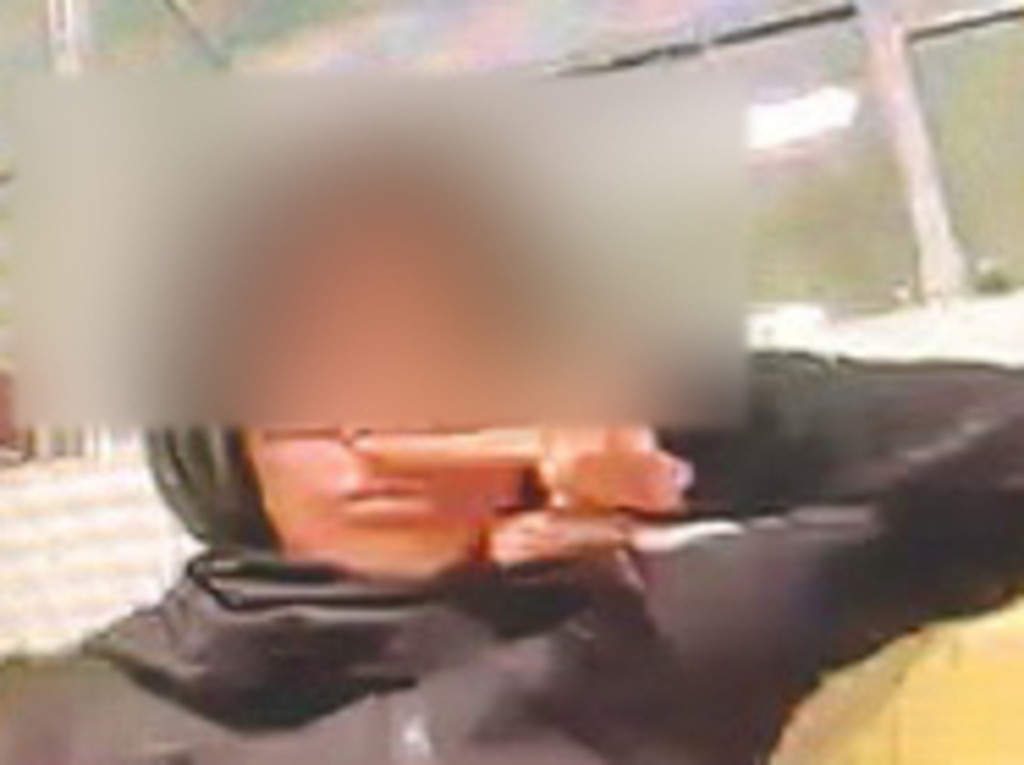ANU expelled two students and referred four to police
The revelations emerged as the university was hauled before a Senate committee for only the second time in its history.
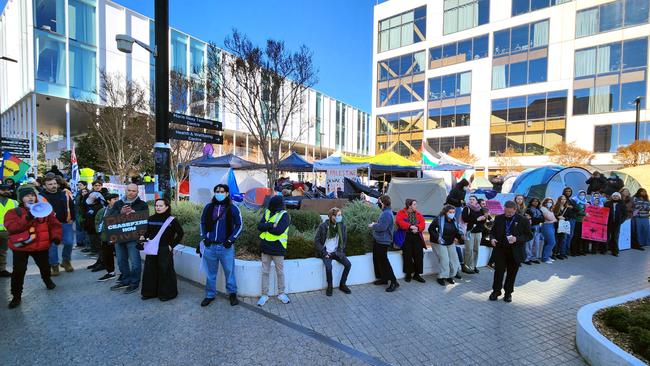
The Australian National University has referred four of its students to police after pro-Palestine protests, and has expelled two students since October last year in relation to protests about the conflict in the Middle East.
The revelations came as the university was hauled before a Senate estimates committee for only the second time in its history – to knowledge – to be grilled on its response to anti-Semitism on campus.
Vice-chancellor Genevieve Bell revealed that the university had also sent a “show cause” notice to the student association following revelations in The Australian of alleged Nazi-inspired gestures at one of its meetings where Jewish students tried to address anti-Semitism.
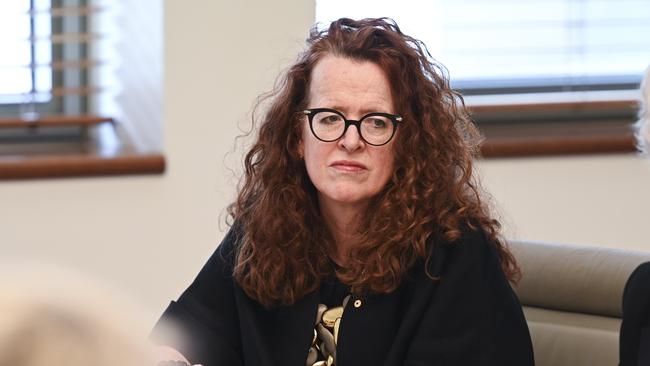
This comes as it has emerged that the higher education regulator warned universities early last month of their obligations to remove material that breaches the law and take action against students and staff who breach policies, as a wave of pro-Palestine protests began to swell on campuses across the country.
Evidence to the Senate estimates committee also revealed that the Australian Research Council had consulted Macquarie University numerous times in relation to one of its staff members, Randa Abdel-Fattah, to express concerns about her behaviour given grants she received that together exceed $800,000.
One of the expelled ANU students is believed to be Beatrice Tucker, who, as revealed by The Australian last month, drew ire for saying that Hamas deserves “unconditional support” in an appearance on ABC radio.
Tucker was also one of four ANU students who has been referred to police, Professor Bell told the committee. The other three consisted of one student who was also on the interview with Tucker, and the other two were those investigated by the university for allegedly making Nazi-inspired gestures at the online student meeting.
Professor Bell said the university had begun disciplinary proceedings against ten students in relation to protest activity since conflict broke out in the Middle East.
Professor Bell said pro-Palestine chants like “from the river to the sea” and “global intifada” were hurtful, but did not cross the line into hate speech and had therefore not banned the phrases on campus.
However, she said that the university had, where it could, asked students not to use those terms.
“On balance, we believe those slogans to be hurtful speech and when we have had a capacity to hold someone accountable we have done so through our disciplinary proceedings,” she said in response to questioning from opposition education spokesperson Sarah Henderson.
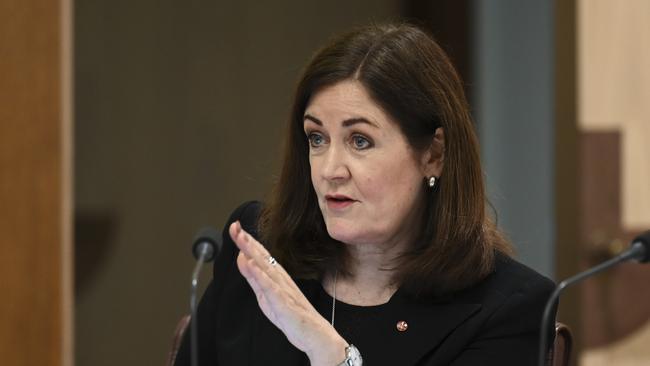
Professor Bell said she had talked to a number of parliamentarians in relation to the encampment protest on campus, including “Julian Leeser, Allegra Spender, Josh Burns, I have talked to (Education) Minister (Jason) Clare, and at least one quite irate call from former politician Josh Frydenberg”.
Thursday’s Senate estimates committee also heard from Australian Research Council deputy chief executive Richard Johnson that the organisation had received an undertaking from Macquarie University that it would investigate academic Randa Abdel-Fattah.
Dr Abdel-Fattah drew criticism when she organised a ‘kids excursion’ to the University of Sydney pro-Palestine encampment that saw primary-school aged children lead each other in chants for ‘intifada’, as revealed by The Australian.
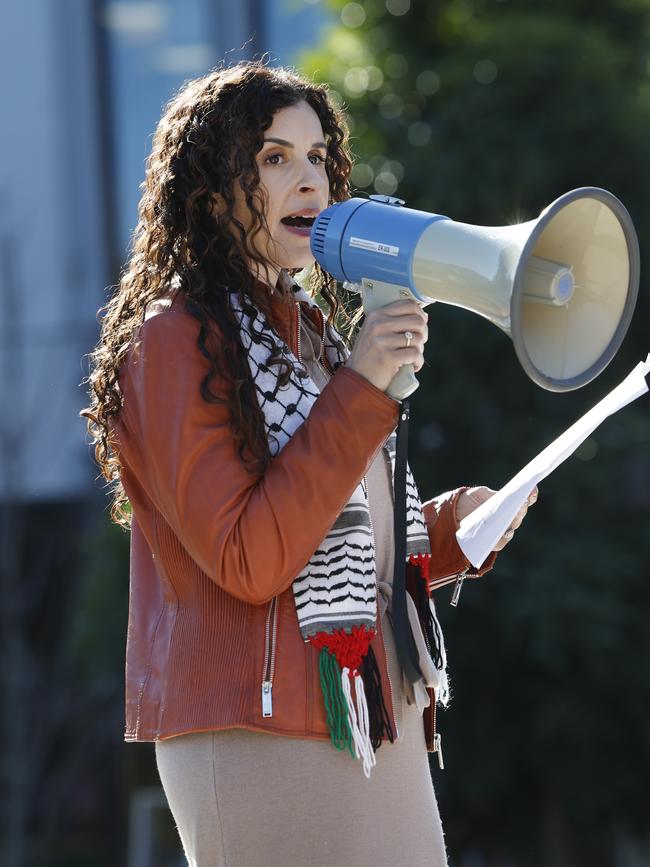
She had previously drawn condemnation for a range of statements and actions, including sharing with her social media followers a link to leaked personal details of Jewish creatives from a WhatsApp group.
“The reported activities prima facie are concerning but to us, only if there is a nexus to the research project that the individual is undertaking,” the ARC’s Dr Johnson said.
“We have engaged with Macquarie University numerous times on this matter in person and in writing.
“I’ve written directly to the deputy vice-chancellor research at Macquarie University … and I’ve sought assurances from Macquarie University regarding the proper undertaking of research in line with the requirements of ARC’s funding agreement.
“The DVCR has provided in correspondence that they are considering whether the research is compliant with both the code of conduct and ARC funding requirements as expeditiously as possible.”
Separately, a letter to universities tabled during Senate estimates revealed that the Tertiary Education Quality and Standards Agency urged universities to ensure that it had appropriate measures in place to respond to the escalation of protests on campuses.
The letter, sent in early May and signed by TEQSA chief commissioner Peter Coaldrake and chief executive Mary Russell, also asked universities to provide fortnightly updates on the number of complaints “relating to freedom of speech or protect action”, the number of complaints and the number of misconduct cases being investigated.
It also stressed the obligations universities had to safeguard the wellbeing and safety of students and staff and “maintain an institutional environment where the wellbeing of students and staff are fostered”, under the Higher Education Standard Framework (Threshold Standards) 2021.
TEQSA also revealed it had received reports of incidents on campuses which could substitute a breach of the standard set by former High Court Chief Justice Robert French in his 2019 review of free speech in the higher education sector.
“Anecdotally, TEQSA is also aware of some incidents within universities where there has been behaviour and acts of symbolism that risk falling outside the French Model Code’s definition of academic freedom and freedom of speech, due to these being against the law or risking harm to students and staff,” the letter said.
“We are also aware of reports that students and staff are concerned about their safety due to people who are not part of the university community coming on to campus to engage in protest activity.
“There have also been reports of protester actions within tutorial and other learning environments, which have resulted in students feeling intimidated and unsafe.”
TEQSA also said universities must remove materials that “breach Australian law or conflict with institutional policies” and take action against students and staff whose conduct breaches institutional policies, including as part of “organised protest activity and language that goes beyond what is acceptable in academic discussions in learning settings.”


